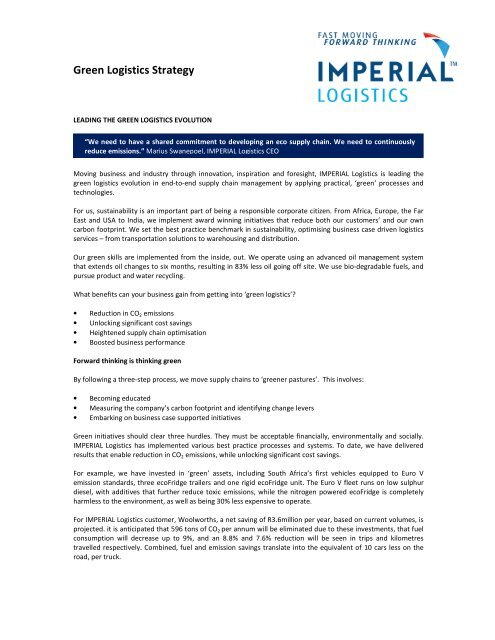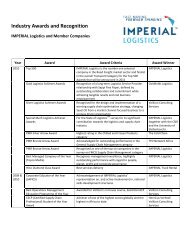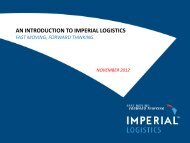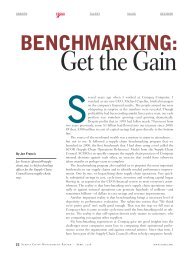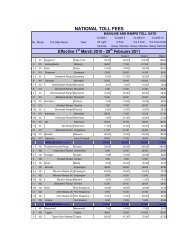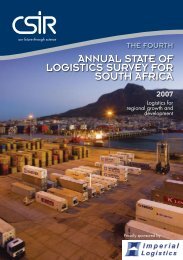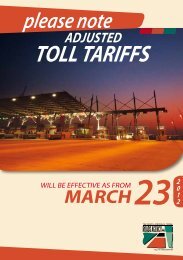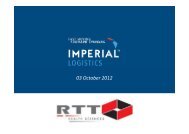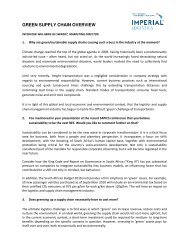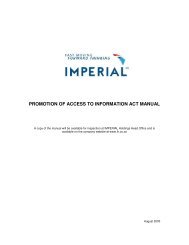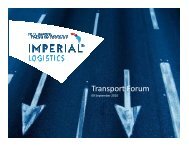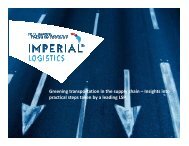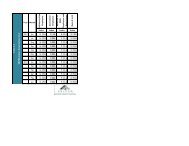Green Logistics Strategy - IMPERIAL Logistics
Green Logistics Strategy - IMPERIAL Logistics
Green Logistics Strategy - IMPERIAL Logistics
- No tags were found...
Create successful ePaper yourself
Turn your PDF publications into a flip-book with our unique Google optimized e-Paper software.
Practical application of sustainability strategy<strong>IMPERIAL</strong> <strong>Logistics</strong>’ environmental strategy is built on the optimal deployment of all current resources (vehicles,drivers, systems) and continuous base-line reductions when new enabling technologies, fuels and systemspropulsion become available. The diagram below outlines our five key ‘green’ focal areas, which are drivingpractical initiatives.We shorten the distances travelled in transporting products and redesign products in collaboration with serviceproviders, e.g. tyres and trucks to reduce energy consumption and waste throughout the product life cycle.<strong>IMPERIAL</strong> <strong>Logistics</strong>’ Technical Department is proactively driving initiatives to reduce the amount of dieselconsumed by the Group. Such initiatives include:• Testing the impact of adding certain additives to the diesel to (a) reduce the consumption of diesel perkilometre and (b) reduce the CO₂ emission of the fuel being consumed.• Due to the high volume of fuel consumed (> 200 000 000 litres of diesel per annum) and proportion of costrelating to fuel (ranging from 35 – 40% of total cost), advanced fuel management systems are deployed inour various operations. The slightest reduction in emissions will have a profound effect on CO₂ emissionacross the total fleet of > 5 500 vehicles in southern Africa and > 6 000 internationally.• A Diesel Management Programme is in place to ensure that the ‘best vehicle for the route’ is deployed,based on CO₂ emissions per vehicle horsepower.On our ‘green’ journey, includes initiatives such as the following:• All fuel used in our Fast’nFresh operation contains 5% ‘biodiesel’.• Borehole water is used to wash the vehicles and all wash water is recycled. In addition, bio-degradabledetergents are used in this process.• Storm water is separated to ensure solid waste is removed before entering the water reticulation system.• Used tyres and oils are disposed of in a responsible manner, using reputable agencies like ‘Oilkol’.These apply to virtually any industry that <strong>IMPERIAL</strong> <strong>Logistics</strong> is involved in from FMCG, Retail, Industrial andConstruction to Petrochemical and Mining.Furthermore, as part of our ‘SA Incorporated’ initiatives, <strong>IMPERIAL</strong> <strong>Logistics</strong> sponsors the annual State of<strong>Logistics</strong> survey, produced in collaboration with the CSIR and Stellenbosch University. Launched in 2004, theauthoritative survey aims to provide a comprehensive picture of the state of logistics in South Africa,incorporating a micro and macro-economic view, as well as industry-level and market segment developmentperspective.Through our partnership, researchers have been able to interact with and test hypotheses in a practicalenvironment, investigating and covering all areas of logistics, including ocean freight, transportation,warehousing and inventory management, with sustainability being a critical agenda item.© Copyright 2010
Enabling greater supply chain certainty<strong>IMPERIAL</strong> <strong>Logistics</strong>, together with Cardiff University (UK) undertook a study in 2009, whereby extra distancetravelled as a result of uncertainties in the supply chain was calculated. The initiative, undertaken incollaboration with Woolworths, resulted in the piloting of an award winning (2009 LAA Enviro Award) initiativethat addressed unnecessary fuel consumption.Introducing the concept of ‘extra distance’ as a measure of uncertainty within the supply chain, variouselements, including network modelling, elimination of ‘dead kilometres’ and other initiatives to reduce fuelconsumption and limit waste, were included in the study. In one case, it was found that of the 207 000 kmscovered in one week, 13 143 kms were ‘extra kilometres’. This would have amounted to an additional1 071 200 kg of carbon released over a period of one year.The study also found that > 6% of the transport distance actually run does not add value to the end customer,with both economic and environmental implications. Typical causes of these ‘extra kilometres’ includeddistribution centre failures (picking delays, queuing delays and other factors), short-notice volume increases, aswell as errors in forecasting and transport planning. By identifying these supply chain uncertainties in aquantifiable manner, significant green (CO 2 reduction) and gold (cost savings) benefits were, and continue to beunlocked for Woolworths.Equipment selection, design and optimisation<strong>IMPERIAL</strong> <strong>Logistics</strong> has been an early adopter of an approach of burning as little as possible fuel, and when wedo, ensuring that it happens with the least amount of harmful emissions. A number of principles are nonnegotiablein our vehicle procurement (CAPEX) process, irrespective of the initial costs involved.Correct vehicle selection and specifications have the most important influence on fuel consumption, and with thewide variety of vehicles and models available, it becomes a fine art to select the most fuel efficient vehicle forthe job. For this reason, <strong>IMPERIAL</strong> <strong>Logistics</strong> decided to purchase two identical vehicles to use on some of its more‘popular’ routes, to undertake testing with different specifications in order to find the ultimate fuel efficientvehicle.As a result of testing done over a period of two years and a distance of more than 400 000 kilometres, vehiclespecifications that are 6% more fuel efficient were identified – which are now a standard for Group-wide newvehicle purchases. We also adhere to detailed vehicle maintenance policies and driver training programmes, tooptimise vehicle capabilities.Join us on our ‘green’ quest<strong>Logistics</strong> activities are one of the most difficult areas of the supply chain to make environmentally friendly.However, for <strong>IMPERIAL</strong> <strong>Logistics</strong>, when it comes to shaping a sustainable future through responsible business,doing nothing is not an option. In fact, there are many options to consider to ‘green’ just your transportation.These range from small process changes such as retraining drivers, to substantial capital investments includingsetting up green DCs.To green the supply chains, corporate executives should consider taking several actions. First and foremost, theyneed to structure the supply chain with suppliers and customers who share similar views on sustainablepractices, and are focused on initiatives that will minimise the impact of their transportation greenhouse gasemissions.They should utilise transportation technology that reduces fuel and emissions. Another action that executivescould take would be to optimise the supply chain's logistical network so that transportation distances areminimised. This can include sourcing locally when feasible, moving operations closer to suppliers or customers,or eliminating unnecessary moves such as those between DCs. Lastly, stakeholders and decision-makers shoulduse knowledgeable personnel with skills in logistics and environmental sustainability, to develop and implementcompany and supply chain transportation and warehousing strategies amongst others.In our experience, integrating sustainability practices throughout the supply chain can deliver tangibleeconomical, environmental and social benefits. Most notably, these benefits have been magnified more than ahundred fold through effective collaboration.© Copyright 2010


